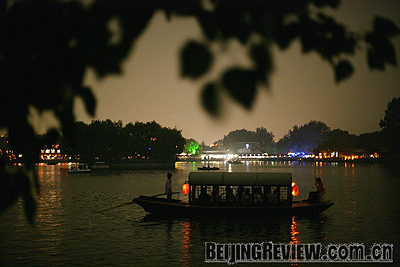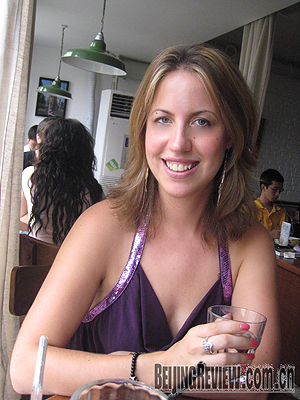|

Dug out in the Yuan Dynasty (1279-1368), Houhai Lake once served as berth for barges from the Grand Canal, bringing goods from around China and beyond to the Emperor. Today it continues to hold global pulling power, but now the goods are replaced by people, who throng to the area in the evening to frequent its many bars, restaurants and teahouses.
The once quiet lake, surrounded by a maze of gray-walled hutongs (narrow streets or alleys), is today a flood of neon lights and music. It is one of the many areas of China's capital that has been transformed into a haven of nightlife.
Beijing's evening scene has grown dramatically in recent years, from a sprawl of pubs in Sanlitun to the east of the city and a narrow range of food, to a myriad of bar zones and hutong hideaways, as well restaurants offering fare from every corner of the globe. To long-term residents an evening in the city is almost unrecognizable from a few years ago.
Atish Ghosh first arrived in Beijing as a language student in 2000, and was a frequent visitor to Houhai.
"Houhai had just a couple of bars back then," he said. "I used to go to a place known as the no name bar, and still do."
Today Houhai is a cacophony of sound and color as glitzy bars compete to drown each other out. The original bar with no name remains, now an oasis of calm in a sea of noise, but the days of a quiet stroll round the lower reaches of the lake are no more.
Atish, and many other Beijing expats, look back on the old days with nostalgia, but also appreciate the choice they now have.
"There definitely was a nightlife then, but it was very different to now," he said.
"Today there are a lot more options. It used to be a lot more limited."

Relative newcomers, like Alison Hines, who has been working in Beijing as an English teacher for the past year, was taken aback by what the city has to offer.
"San Francisco nightlife is pretty good," said the Californian native, "but it doesn't compare to the nightlife in Beijing."
"Here it's easy to meet people and clubs stay open until sunrise, while in San Francisco most close around 2 a.m."
Young at heart
In a city more traditionally known for tea than beer, she was surprised at the amount of alcohol consumed.
"People tend to do more binge drinking here, because they can, it's cheaper," she said. "The lifestyle of a lot of people is pretty irresponsible. A lot of expats here are either young or young at heart."
As the manager of Obiwan bar, Katja Drinhausen from Germany, sees Beijing's nightlife from a different perspective.
According to her, bars in Beijing tend to cluster together, and getting people to come to a place off the beaten track can be difficult.
Chinese and foreign drinkers mix together much more nowadays than in the past, she said, but often take a different approach to going out.
Most expats expect cheap drinks, and are used to paying the price on the menu.
"Chinese customers are used to getting discounts on the menu. They like to haggle," she said.
One of the things Drinhausen likes best about Beijing nightlife is its growing diversity.
"More and more places are not just about loud music and flashing lights or cheap drinks," she said. "There is much more to see in the city's nightlife than just a beer."
The city's evening diversity caters to many tastes, from all night raves to relaxing lounges.
"One of my favorite areas is Sanlitun," said Hines. "Salsa Caribe there is great for dancing and meeting people, the music is good, and it feels friendly. I also like the White Rabbit on Lucky Street. The people there are very friendly."
Hines is also a fan of Beijing's live music scene. "I found I like a lot of local bands, although they usually have a Western sound," she said. "Carsick Cars are my favorite."
For a quieter evening she enjoys Nanluoguxiang, a narrow hutong lined with mostly small and very unique bars and restaurants.
"It's a good place to meet friends and actually be able to hear each other talking," she added.
Of course, there is more to do during an evening in Beijing than drink. The city abounds with restaurants; so many in fact that it can be hard to pick where to go.
"There are so many more restaurants now than there used to be, especially when you think of food from around the world," said Ghosh. "It's much more diverse and there are so many choices."
Fantastic food
Unlike the bar and club scene, good restaurants in Beijing are spread out everywhere. Some districts are more expensive than others, and some restaurants look more atmospheric, but when it comes to food the Beijing quality test is number of people, according to Ghosh.
"If you see a place and it's packed, you know that place is good. A lot of the time it's true the opposite way too."
Many of Beijing's food gems are well known and appear in guidebooks for the city, but many more exist largely unknown.
"When it comes to Chinese cuisine, there are tiny restaurants serving the most fantastic food," said Ghosh.
Like pubs in Britain and cafes in France, in Beijing teahouses were the traditional place for friends to meet. They were originally a social center for all classes, from noblemen to peddlers, to chat and catch up on events. Today teahouses are more of a special evening out and much of the chatter is replaced by a show-often including Peking opera, acrobatics, crosstalk and magic tricks.
"I sometimes go to a teahouse, but it's more of a one-off. I love drinking tea, but I just have it at home," said Ghosh.
One of Beijing's most popular teahouses is Lao She Teahouse. At its nightly shows, patrons are seated according to the price they pay with the better seats closer to the stage. An evening here includes snacks and a sampling of quality teas. The show provides a glimpse into a variety of Chinese arts, without having to sit through a whole performance of any single one.
Many other teahouses provide tea without the show, but usually there is some sort of tea ceremony performed by a silk-clad waiter or waitress. They provide a glimpse into the importance of tea in China as a means to relax, an everyday drink, a ceremonial custom and a medicine.
Cafes were once almost non-existent in Beijing. Today they are gradually taking the place of teahouses as an everyday meeting place.
Starbucks is all over the city. Other favorites include Sculpting in Time, which has several locations, and The Bridge Café in Wudaokao, in the city's northwest.
The changes in Beijing's nightlife have been driven by a growing population of expats, combined with a desire for new forms of entertainment by young Chinese. This has have helped to fuel the explosion in bars, as well as the taste for foreign food and coffee.
They've helped to create a "vibrant" atmosphere, according to Ghosh. "Today in Beijing there is a lot happening," he said. "Wherever you go, especially on the weekends, every place seems to be packed."
According to Hines, many of the city's expats come to Beijing, "to escape or because they are searching for something." |